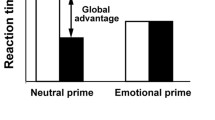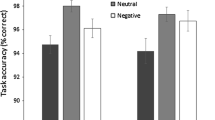Abstract
Previous findings on the relationship between positive mood and global processing are often based on visual matching tasks that involve a choice between global and local strategies. Preferences for global processing in positive mood, however, do not imply a reduced ability to process locally. The present experiment tested the assumption that positive affect increases flexibility in cognitive processing as indicated by the ability to overcome global precedence, and to respond rapidly to non-dominant (local) features when the task necessitates it. Consistent with expectations, participants responded significantly faster to local targets after positive compared to neutral and negative prime words. The typical precedence of global over local processing observed after neutral and negative prime words was reversed after positive prime words. Findings support the assumption that positive affect increases cognitive flexibility. Furthermore, findings suggest that mood-related preferences in global versus local processing cannot be generalized to processing ability.
Similar content being viewed by others
References
Basso, M. R., Schefft, B. K., Ris, M. D., & Dember, W. M. (1996). Mood and global-local visual processing. Journal of the International Neuropsychological Society, 2, 249–255.
Baumann, N., & Kuhl, J. (2002). Intuition, affect, and personality: Unconscious coherence judgments and self-regulation of negative affect. Journal of Personality and Social Psychology, 83, 1213–1223.
Beeman, M., Friedman, R. B., Grafman, J., Perez, E., Diamond, S., & Lindsay, M. B. (1994). Summation priming and coarse semantic coding in the right hemisphere. Journal of Cognitive Neuroscience, 6, 26–45.
Bodenhausen, G. V., Kramer, G. P., & Susser, K. (1994). Happiness and stereotypic thinking in social judgment. Journal of Personality and Social Psychology, 66, 621–632.
Bolte, A., Goschke, T., & Kuhl, J. (2003). Emotion and Intuition: Effects of positive and negative mood on implicit judgments of semantic coherence. Psychological Science, 14, 416–421.
Clore, G. L., Gasper, K., & Garvin, E. (2001). Affect-as-information. In J. P. Forgas (Ed.), Handbook of affect and social cognition (pp. 121–144). Mahwah, NJ: Erlbaum.
Derryberry, D., & Reed, M. A. (1998). Anxiety and attentional focusing: Trait, state and hemispheric influences. Personality and Individual Differences, 25, 745–761.
Dreisbach, G., & Goschke, T. (2004). How positive affect modulates cognitive control: Reduced perseveration at the cost of increased distractibility. Journal of Experimental Psychology: Learning, Memory, and Cognition, 30, 343–353.
Epstein, S., Pacini, R., Denes-Raj, V., & Heier, H. (1996). Individual differences in intuitive-experiential and analytical-rational thinking styles. Journal of Personality and Social Psychology, 71, 390–405.
Estrada, C. A., Isen, A. M., & Young, M. J. (1997). Positive affect facilitates integration of information and decreases anchoring in reasoning among physicians. Organizational and Human Decision Processes, 72, 117–135.
Gasper, K. (2004). Do you see what I see? Affect and visual information processing. Cognition and Emotion, 18, 405–421.
Gasper, K., & Clore, G. L. (2002). Attending to the big picture: Mood and global versus local processing of visual information. Psychological Science, 13, 34–40.
Isen, A. M. (1999a). Positive affect. In T. Dalgleish & M. J. Power (Eds.), Handbook of cognition and emotion (pp. 521–539). New York: Wiley & Sons.
Isen, A. M. (1999b). Positive affect and creativity. In S. Russ (Ed.), Affect, creative experience, and psychological adjustment (pp. 3–17). Philadelphia: Bruner/Mazel.
Isen, A. M. (2001). An influence of positive affect on decision making in complex situations: Theoretical issues with practical implications. Journal of Consumer Psychology, 11, 75–85.
Isen, A. M. (2004). Some perspectives on positive feelings and emotions: Positive affect facilitates thinking and problem solving. In A. S. R. Manstead, N. Frijda, & A. Fischer (Eds.), Feelings and emotions: The Amsterdam symposium (pp. 263–281). Cambridge, NY: Cambridge University Press.
Isen, A. M., Johnson, M. M. S., Mertz, E., & Robinson, G. F. (1985). The influence of positive affect on the unusualness of word associations. Journal of Personality and Social Psychology, 48, 1413–1426.
Kahn, B. E., & Isen, A. M. (1993). The influence of positive affect on variety seeking among safe, enjoyable products. Journal of Consumer Research, 20, 257–270.
Kazén, M., & Kuhl, J. (2005). Needs and the modulation of cognitive systems: Volitional facilitation and inhibition as a function of affective contents of need-related stimuli. Journal of Personality and Social Psychology, 89(3).
Kazén, M., & Kuhl, J. (2005). Affect regulation in a missing figure task: The role of strategic and personality factors. Manuscript submitted for publication. University of Osnabrück, Germany.
Kimchi, R. (1992). Primacy of wholistic processing and global/local paradigm: A critical review. Psychological Bulletin, 112, 24–38.
Kimchi, R., & Palmer, S. E. (1982). Form and texture in hierarchically constructed patterns. Journal of Experimental Psychology: Human Perception and Performance, 8, 521–535.
Koole, S. L., & Kuhl, J. (2003). In search of the real self: A functional perspective on optimal self esteem and authenticity. Psychological Inquiry, 14, 43–49.
Koole, S., & Jostmann, N. (2004). Getting a grip on your feelings: Effects of action orientation and external demands on intuitive affect regulation. Journal of Personality and Social Psychology, 87, 974–990.
Kuhl, J. (2000). A functional-design approach to motivation and self-regulation: The dynamics of personality systems interactions. In M. Boekaerts, P. R. Pintrich & M. Zeidner (Eds.), Self-regulation: Directions and challenges for future research (pp. 111–169). New York: Academic Press.
Kuhl, J. (2001). Motivation und Persönlichkeit [Motivation and personality]. Göttingen, Germany: Hogrefe.
Kuhl, J., & Kazén, M. (1999). Volitional facilitation of difficult intentions: Joint activation of intention memory and positive affect removes stroop interference. Journal of Experimental Psychology: General, 128, 382–399.
Navon, D. (1977). Forest before trees: The precedence of global features in visual processing. Cognitive Psychology, 9, 353–383.
Navon, D. (1983). How many trees does it take to make a forest? Perception, 12, 239–254.
Rotenberg, V. S. (1993). Richness against freedom: Two hemisphere functions and the problem of creativity. European Journal for High Ability, 4, 11–19.
Schwarz, N. (2002). Feelings as information: Mood influence judgment and processing strategies. In T. Gilovich, D. Griffin, & D. Kahnemann (Eds.), Heuristic and biases: The psychology of intuitive judgment (pp. 534–547). Cambridge, NY: Cambridge University Press.
Wheeler, M. A., Stuss, D. T., & Tulving, E. (1997). Toward a theory of episodic memory: The frontal lobes and autonoetic consciousness. Psychological Bulletin, 121, 331–354.
Author information
Authors and Affiliations
Corresponding author
Rights and permissions
About this article
Cite this article
Baumann, N., Kuhl, J. Positive Affect and Flexibility: Overcoming the Precedence of Global over Local Processing of Visual Information. Motiv Emot 29, 123–134 (2005). https://doi.org/10.1007/s11031-005-7957-1
Issue Date:
DOI: https://doi.org/10.1007/s11031-005-7957-1




